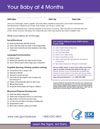Important Milestones: Your Baby at Four Months
How your child plays, learns, speaks, and acts offers important clues about your child’s development. Developmental milestones are things most children can do by a certain age.
Check the milestones your child has reached by the end of 4 months. Take this with you and talk with your child’s doctor at every visit about the milestones your child has reached and what to expect next.
What most babies do at this age:
Social and Emotional
- Smiles spontaneously, especially at people
- Likes to play with people and might cry when playing stops
- Copies some movements and facial expressions, like smiling or frowning
Language/Communication
- Begins to babble
- Babbles with expression and copies sounds he hears
- Cries in different ways to show hunger, pain, or being tired

Cognitive (learning, thinking, problem-solving)
- Lets you know if she is happy or sad
- Responds to affection
- Reaches for toy with one hand
- Uses hands and eyes together, such as seeing a toy and reaching for it
- Follows moving things with eyes from side to side
- Watches faces closely
- Recognizes familiar people and things at a distance
Movement/Physical Development
- Holds head steady, unsupported
- Pushes down on legs when feet are on a hard surface
- May be able to roll over from tummy to back
- Can hold a toy and shake it and swing at dangling toys
- Brings hands to mouth
- When lying on stomach, pushes up to elbows
Act early by talking to your child’s doctor if your child:
- Doesn’t watch things as they move
- Doesn’t smile at people
- Can’t hold head steady
- Doesn’t coo or make sounds
- Doesn’t bring things to mouth
- Doesn’t push down with legs when feet are placed on a hard surface
- Has trouble moving one or both eyes in all directions
If You’re Concerned – Act Early
Tell your child’s doctor or nurse if you notice any of these signs of possible developmental delay for this age, andtalk with someone in your community who is familiar withservices for young children in your area, such as your state’s public early intervention program. For more information, visit our "If You’re Concerned" web page or call 1-800-CDC-INFO.
“Learn the signs. Act early.” materials are not a substitute for standardized, validated developmental screening tools.
Adapted from CARING FOR YOUR BABY AND YOUNG CHILD: BIRTH TO AGE 5, Fifth Edition, edited by Steven Shelov and Tanya Remer Altmann © 1991, 1993, 1998, 2004, 2009 by the American Academy of Pediatrics and BRIGHT FUTURES: GUIDELINES FOR HEALTH SUPERVISION OF INFANTS, CHILDREN, AND ADOLESCENTS, Third Edition, edited by Joseph Hagan, Jr., Judith S. Shaw, and Paula M. Duncan, 2008, Elk Grove Village, IL: American Academy of Pediatrics.

Contact Us:
- Centers for Disease Control and Prevention
National Center on Birth Defects and Developmental Disabilities
Division of Birth Defects and Developmental Disabilities
1600 Clifton Road
MS E-87
Atlanta, GA 30333 - 800-CDC-INFO
(800-232-4636)
TTY: (888) 232-6348
New Hours of Operation
8am-8pm ET/Monday-Friday
Closed Holidays - cdcinfo@cdc.gov





